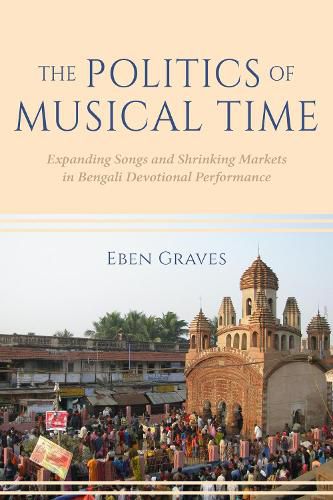Readings Newsletter
Become a Readings Member to make your shopping experience even easier.
Sign in or sign up for free!
You’re not far away from qualifying for FREE standard shipping within Australia
You’ve qualified for FREE standard shipping within Australia
The cart is loading…






How does sacred music contribute to modern social life in South Asia? Due to time constraints in commercial contexts, Bengali musicians have had to adopt techniques of popular music to promote their own religious musical careers and religious perspectives.
The Politics of Musical Time traces a lineage of the devotional song known as kirtan in the Bengal region of India over the past century to demonstrate the shifting meanings of devotional performance. Focusing on padabali kirtan, a long format that combines devotional song and storytelling, Eben Graves examines how expressions of religious affect and political belonging are strained in contemporary, shortened performance time frames. To illustrate the political economy of performance in South Asia, Graves also explores how religious performances and texts interact with issues of nationalism, gender, and economic exchange.
Combining ethnography, history, performance analysis, and videos from the author’s fieldwork in India, The Politics of Musical Time reveals how, over centuries, devotional performances in East India have used musical time to express ideas about the sacred and the modern.
$9.00 standard shipping within Australia
FREE standard shipping within Australia for orders over $100.00
Express & International shipping calculated at checkout
How does sacred music contribute to modern social life in South Asia? Due to time constraints in commercial contexts, Bengali musicians have had to adopt techniques of popular music to promote their own religious musical careers and religious perspectives.
The Politics of Musical Time traces a lineage of the devotional song known as kirtan in the Bengal region of India over the past century to demonstrate the shifting meanings of devotional performance. Focusing on padabali kirtan, a long format that combines devotional song and storytelling, Eben Graves examines how expressions of religious affect and political belonging are strained in contemporary, shortened performance time frames. To illustrate the political economy of performance in South Asia, Graves also explores how religious performances and texts interact with issues of nationalism, gender, and economic exchange.
Combining ethnography, history, performance analysis, and videos from the author’s fieldwork in India, The Politics of Musical Time reveals how, over centuries, devotional performances in East India have used musical time to express ideas about the sacred and the modern.